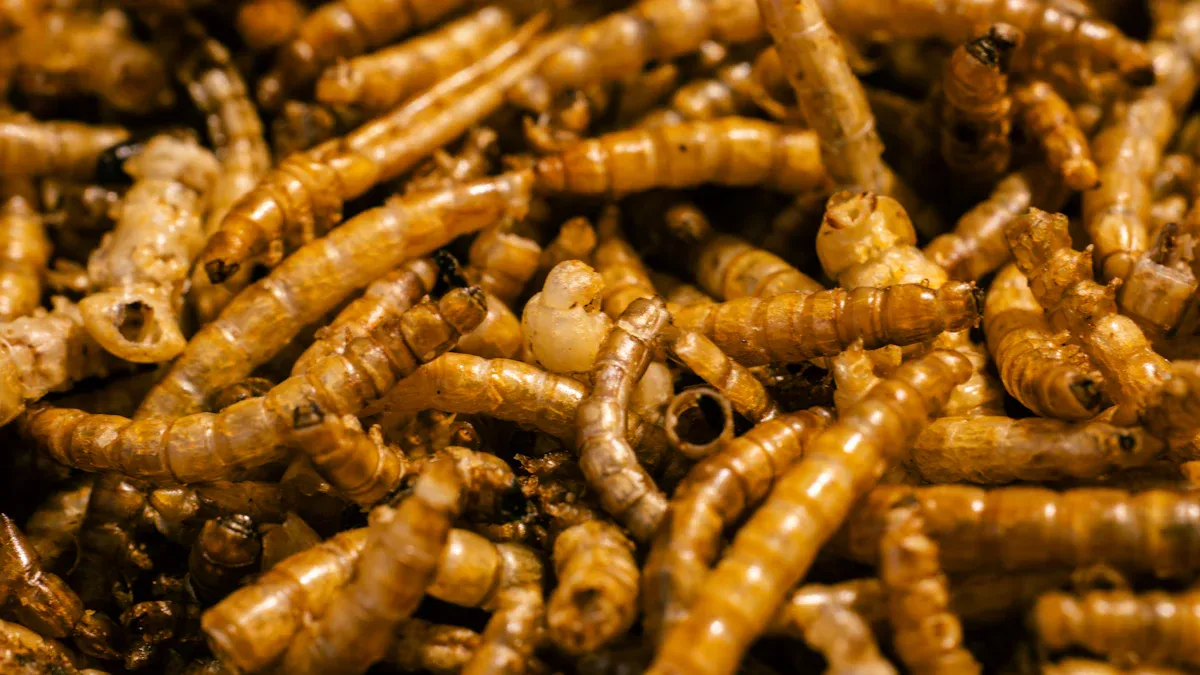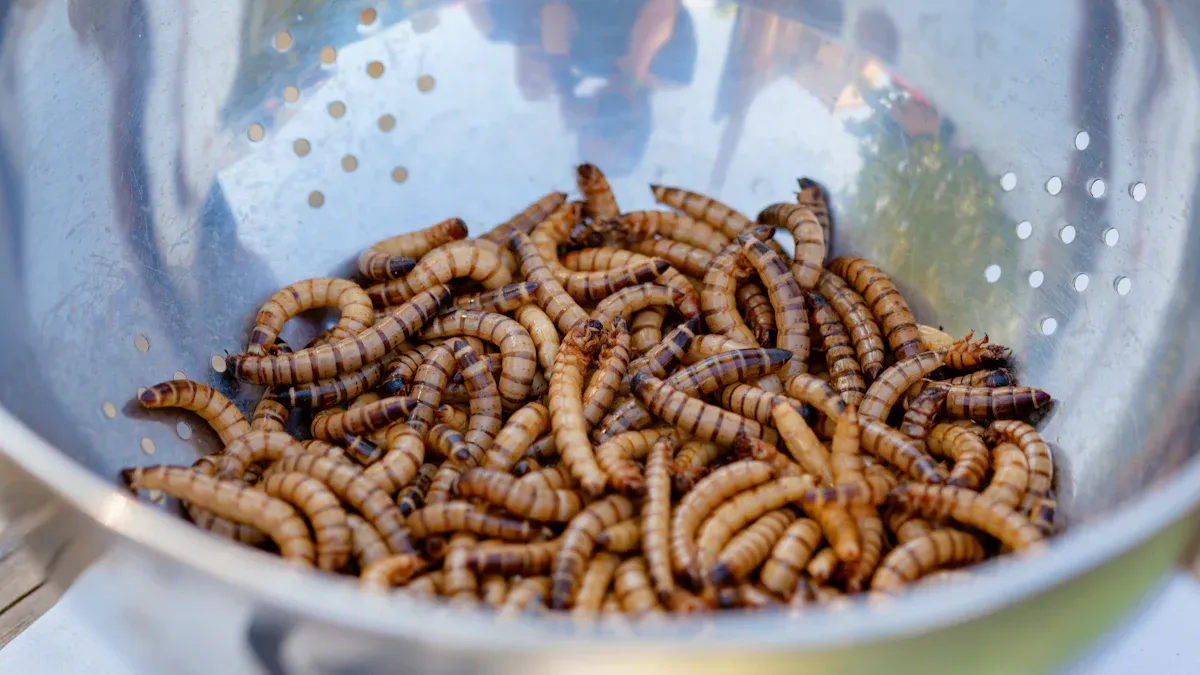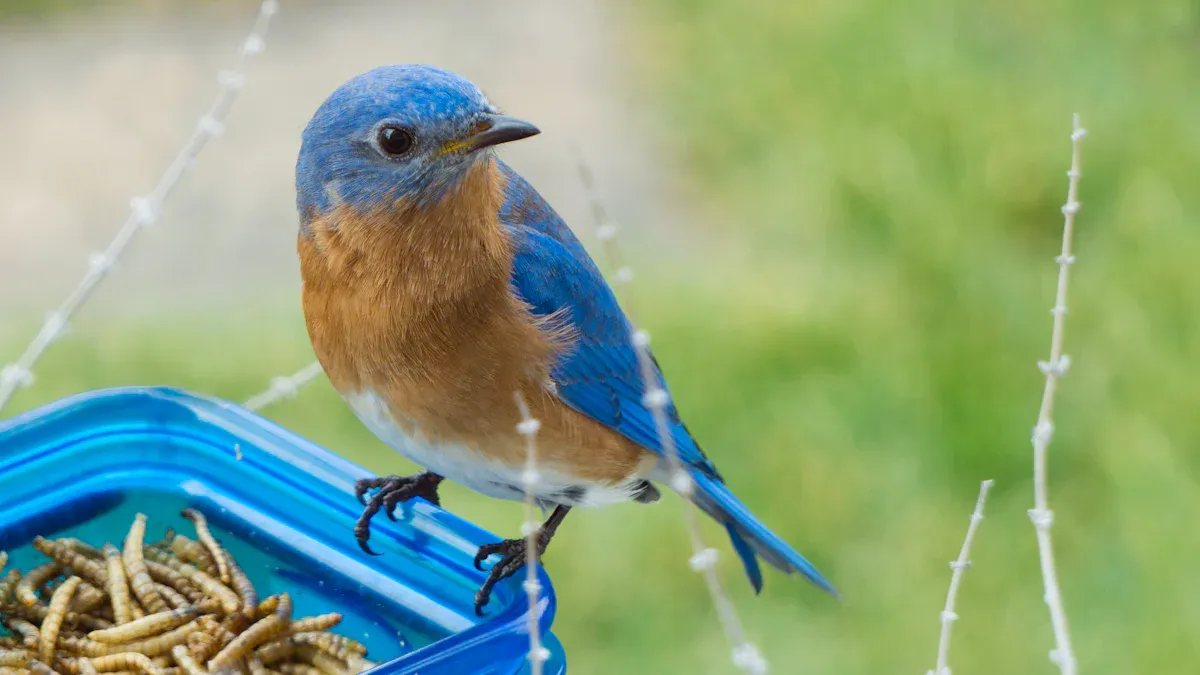
Dried Mealworm for pets offers an incredible nutritional boost. They’re packed with protein, vitamins, and minerals that help pets thrive. This sustainable option works for birds, reptiles, and even small mammals. Many pet owners don’t realize how beneficial these tiny treats can be, but they’re truly a game-changer for pet health.
Key Takeaways
- Dried mealworms have lots of protein, which helps pets grow strong. They give pets energy and help build muscles when added to their food.
- These snacks have vitamins and minerals that keep pets healthy. They can make birds’ feathers shinier and small animals’ fur look better.
- Dried mealworms are good for the environment. Picking them means you care about nature while giving pets healthy treats.
Why Dried Mealworm for Pets Is a Great Choice
Packed with Protein for Growth and Energy
Protein is essential for pets to grow strong and stay active. Dried Mealworm for pets provides a rich source of high-quality protein that fuels their energy and supports muscle development. Whether it’s a bird building feathers or a reptile shedding its skin, protein plays a vital role in these processes.
Unlike some other protein sources, mealworms are easy to digest, making them ideal for pets with sensitive stomachs. They also contain balanced amino acids, which are the building blocks of protein. These amino acids help repair tissues, boost immunity, and promote overall vitality.
Tip: If your pet seems sluggish or lacks energy, adding dried mealworms to their diet could make a noticeable difference.
Rich in Essential Nutrients for Overall Health
Dried Mealworm for pets isn’t just about protein. They’re also packed with essential vitamins and minerals that contribute to a pet’s overall well-being. For example, they contain B vitamins, which support metabolism and energy production. They also provide iron, which helps maintain healthy blood cells, and phosphorus, which strengthens bones and teeth.
These nutrients work together to enhance your pet’s health from the inside out. Birds may develop shinier feathers, reptiles can maintain stronger shells, and small mammals might show improved fur quality. The nutritional benefits are visible in their appearance and behavior.
A Sustainable and Eco-Friendly Food Option
Mealworms aren’t just good for pets—they’re good for the planet too. As a sustainable food source, they require fewer resources to produce compared to traditional livestock. They can even convert agricultural by-products into protein, making them a key player in resource-efficient food production.
Here’s a quick look at why mealworms are an eco-friendly choice:
| Key Points | Description |
|---|---|
| Sustainability | Mealworms can convert agricultural by-products into protein, contributing to resource-efficient food production. |
| Circular Economy | They are linked to circular food systems, addressing resource scarcities and environmental issues. |
| Future Research | Further studies are needed on feeding trials and legal frameworks to maximize benefits of mealworm farming. |
By choosing dried mealworms, pet owners can support a more sustainable future while providing their pets with a nutritious treat. It’s a win-win for both pets and the environment!
Are Dried Mealworm for Pets Safe?
Importance of Quality Sourcing and Storage
When it comes to feeding pets, quality matters. Dried mealworms should come from trusted suppliers who follow strict safety standards. This ensures the mealworms are free from harmful chemicals, pesticides, or contaminants. Always check the packaging for certifications or labels that guarantee quality.
Proper storage is just as important. Keep dried mealworms in an airtight container to maintain freshness and prevent moisture from getting in. Moisture can lead to mold, which is unsafe for pets. Store them in a cool, dry place, away from direct sunlight.
Tip: If you notice a strange smell or discoloration, it’s best to discard the mealworms and get a fresh batch.
Monitoring for Allergies or Sensitivities
Just like humans, pets can have allergies or sensitivities to certain foods. While dried mealworms are generally safe, it’s a good idea to introduce them slowly. Start with a small amount and observe your pet’s reaction. Look for signs like itching, swelling, or changes in behavior.
If your pet shows any unusual symptoms, stop feeding them mealworms and consult a veterinarian. Some pets may take time to adjust to new foods, so patience is key.
Note: Allergies are rare, but it’s always better to be cautious when trying something new.
Feeding in Moderation to Avoid Digestive Issues
Even though dried mealworms are nutritious, overfeeding can cause problems. Too many mealworms might upset your pet’s stomach or lead to weight gain. Moderation is the golden rule.
Follow the recommended serving sizes based on your pet’s size and species. For example, small birds or reptiles may only need a few mealworms per day, while larger pets can handle more. Use mealworms as a supplement to their regular diet, not as a replacement.
Reminder: Balance is key. A varied diet keeps pets healthy and happy.
Nutritional Value of Dried Mealworm for Pets

High Protein Content and Balanced Amino Acids
Protein is the building block of life, and dried mealworms deliver it in abundance. They contain up to 50% protein, making them an excellent choice for pets that need energy and muscle support. The protein in mealworms is also rich in balanced amino acids, which are essential for tissue repair and growth.
Pets like birds and reptiles benefit greatly from these amino acids. Birds use them to grow vibrant feathers, while reptiles rely on them for healthy skin and scales. Even small mammals, like hamsters, can enjoy stronger muscles and better overall health.
Tip: For pets recovering from illness or injury, dried mealworms can provide the extra protein they need to heal faster.
Comparison with Other Pet Treats
When compared to other pet treats, dried mealworms stand out for their nutritional value. Many commercial treats are high in fillers or artificial ingredients, offering little more than empty calories. In contrast, mealworms are a natural source of protein, vitamins, and minerals.
Here’s a quick comparison:
| Treat Type | Protein Content | Additives | Nutritional Benefits |
|---|---|---|---|
| Dried Mealworms | High (50%) | None | Protein, amino acids, vitamins |
| Commercial Treats | Low to Moderate | Yes | Minimal |
This makes dried mealworms a healthier and more wholesome option for pets.
Benefits for Specific Health Needs (e.g., skin, coat, energy)
Dried mealworms offer targeted benefits for various health needs. Their high protein content boosts energy levels, helping active pets stay playful and alert. The vitamins and minerals in mealworms also promote a shiny coat, healthy skin, and strong bones.
For example, birds fed with mealworms often develop brighter feathers, while reptiles show improved shell strength. Small mammals may experience better fur quality and increased vitality. These benefits make dried mealworms a versatile addition to any pet’s diet.
Which Pets Can Benefit from Dried Mealworm for Pets?

Birds (e.g., backyard chickens, parrots)
Birds love dried mealworms! These protein-packed treats are perfect for backyard chickens, helping them lay strong, healthy eggs. Parrots also benefit from the vitamins and minerals in mealworms, which can enhance their vibrant feathers. Adding mealworms to a bird’s diet can keep them active and chirping happily.
Tip: Sprinkle a handful of mealworms into your bird feeder to attract wild birds like robins and blue jays. It’s a great way to support local wildlife!
Reptiles (e.g., lizards, turtles)
Reptiles thrive on the high protein content of dried mealworms. Lizards, like geckos and bearded dragons, enjoy the crunchy texture, while turtles benefit from the nutrients that support shell health. Mealworms mimic the natural prey reptiles would find in the wild, making them an excellent addition to their diet.
Small Mammals (e.g., hamsters, hedgehogs)
Small mammals, such as hamsters and hedgehogs, can enjoy dried mealworms as a tasty treat. These little critters need protein to stay energetic and maintain their playful nature. Mealworms also support their fur health, keeping it soft and shiny.
Fish (e.g., koi, goldfish)
Fish, especially koi and goldfish, benefit from the nutrients in dried mealworms. These treats float on water, making them easy for fish to eat. The protein helps fish grow and maintain their vibrant colors. Watching fish snack on mealworms can also be a fun experience for pet owners!
Note: Always feed mealworms in moderation to avoid overfeeding your pets.
How to Incorporate Dried Mealworm for Pets into Their Diet
Recommended Serving Sizes and Frequency
Serving sizes depend on the type and size of the pet. For small birds or reptiles, just a few dried mealworms per day work well. Larger pets, like chickens or koi fish, can enjoy a handful. Pet owners should aim to use mealworms as a supplement, not a primary food source. Feeding them two to three times a week is usually enough to provide the nutritional boost pets need.
Tip: Always check your pet’s behavior and adjust serving sizes if needed. Overfeeding can lead to weight gain or digestive issues.
Mixing Mealworms with Regular Food
Dried mealworms blend easily with most pet foods. Sprinkle them over pellets, seeds, or fresh vegetables to create a balanced meal. For reptiles, mix mealworms with leafy greens or other insects. This method ensures pets get a variety of nutrients while enjoying the taste of mealworms.
Using Mealworms as Treats or Training Rewards
Mealworms make excellent treats for pets. Their crunchy texture and rich flavor appeal to birds, reptiles, and small mammals. Use them as rewards during training sessions to encourage good behavior. For example, offer a few mealworms to a parrot learning new tricks or a hamster exploring its habitat.
Note: Treats should make up no more than 10% of a pet’s diet to maintain overall health.
Soaking Mealworms for Added Moisture
Some pets prefer softer food. Soaking dried mealworms in water for a few minutes rehydrates them, making them easier to chew. This is especially helpful for young or older pets with sensitive teeth or beaks. Rehydrated mealworms also provide a small hydration boost, which can be beneficial in hot weather.
Reminder: Always discard any uneaten soaked mealworms to prevent spoilage.
Dried Mealworm for pets offers a nutritious and versatile option for enhancing pet health. Pets love the protein and fat they provide, making them a delightful treat. Experts agree that mealworms are a great supplement to a varied diet. Birds, reptiles, and small mammals thrive on this addition, showing visible improvements in energy and happiness.
- Benefits pets enjoy:
- High protein and fat for energy and growth.
- A tasty treat that pets genuinely enjoy.
- A supplement that supports overall well-being.
Adding dried mealworms to your pet’s diet is a simple way to boost their nutrition and happiness.
Note: Try dried mealworms today and see the difference in your pet’s vitality and joy!
Article by Felix.
FAQ
Can dried mealworms replace my pet’s regular food?
No, dried mealworms should only supplement your pet’s diet. They provide extra nutrients but don’t offer a complete nutritional profile.
How do I store dried mealworms properly?
Keep them in an airtight container in a cool, dry place. Avoid moisture to prevent mold.
Tip: Check for strange smells or discoloration before feeding.
Are dried mealworms suitable for all pets?
Most pets, like birds, reptiles, and small mammals, enjoy mealworms. However, always introduce them gradually and monitor for allergies.
🐾 Note: Consult a vet for specific dietary needs.

